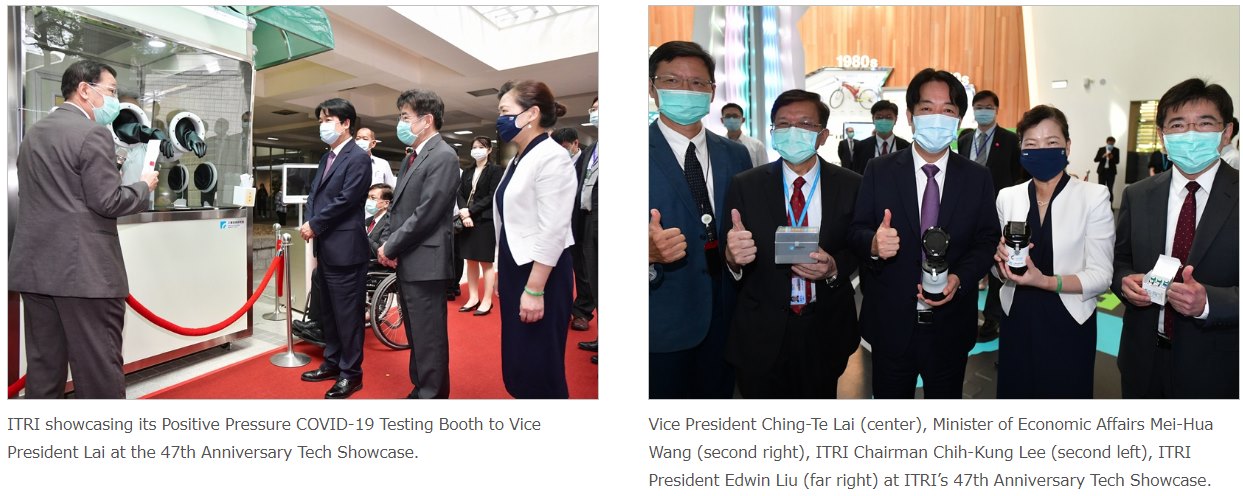ITRI Celebrates
Its 47th Anniversary

Celebrating ITRI's 47th anniversary, Vice President Ching-Te Lai and Minister of Economic Affairs Minister Mei-Hua Wang recognized the Institute as an important asset to the nation. ITRI, they said, has led industry in breakthroughs and fostered development throughout different stages of growth. Vice President Lai further expressed his hope that ITRI will continue to underpin Taiwan's industrial competitiveness and create new horizons for Taiwan's economy.
Vice President Lai remarked that ITRI has developed a number of COVID-19 prevention technologies during the current pandemic, and has become a behind-the-scenes hero in preventing the spread of the virus. He hopes that ITRI can complete three missions in the future. First, ITRI is an important assistant to the government in industrial innovation, and he hopes ITRI will make even more efforts and contributions to the government's 5+2 Industrial Innovation and the Six Core Strategic Industries initiatives. Second, COVID-19 has changed the lifestyle of society and the industrial supply chain. This offers new opportunities for Taiwan, and it is hoped that ITRI will emphasize its spirit of innovation in helping the nation respond to the new era. Third, with the arrival of the global 5G era, ITRI should maximize its strengths in using technology to strengthen industry's competitiveness. Meanwhile, in recent years the government has promoted a developmental roadmap for southern Taiwan, and believes that ITRI can expand its capacities in the southern part of the island, linking the Liujia Campus, Shalun Smart Green Energy Science City, and the Kaohsiung Material Circular Industrial Park. This will help promote industrial development in southern Taiwan, he said.
Economics Minister Wang commented that Taiwan is home to many small- and medium-sized enterprises, and ITRI is especially needed to help nurture the development of SMEs. Minister Wang said if Taiwan desires to open up international exchanges, it still must consider issues related to epidemic prevention. Consequently, Taiwan will require the assistance of technology. In particular, it will turn to the development of ITRI's Nucleic Acid Detection System. This highly precise detection technology will enable Taiwan to effectively prevent the entry of coronavirus at the border, thereby enabling international interactions to resume, she said.
ITRI Chairman Chih-Kung Lee stated that ITRI will continue to respond to the government's policy of balanced economic development among Taiwan's regions, and its efforts will revolve around the two strategic cores of "adding value to industrial technology" and "fostering the development of innovation-oriented industries." ITRI will bridge the industrial, academic and research capacities of southern Taiwan, helping to promote "smart R&D," "high-end manufacturing clusters," and "high added-value materials." This will undoubtedly contribute to the development of southern Taiwan, he said. In the future, ITRI will continue to play a key role in innovation, enabling Taiwan's technological strengths to become prominent the world over, just like it has achieved in its effort to prevent the spread of COVID-19.
ITRI President Edwin Liu said that earlier this year during the outbreak of COVID-19, ITRI adopted a three-pronged strategy of preparing protective devices and equipment, establishing virus testing capacities, and strengthening medical care. Efforts in this regard highlighted the use of technology to protect Taiwan, he said. In the wake of a "new normal" following the outbreak, ITRI has continued to stay ahead of the curve, developing "Taiwan smart value." He explained that the focus of thinking has shifted from emphasizing manufacturing to creating smart and innovative technologies that will meet the lifestyle scenarios of the future. ITRI has set forth its 2030 Technology Strategies and Blueprint, which responds precisely to the government's Six Strategic Industries and its 2030 Technology Vision. Smart Living, Quality Health, and Sustainable Environment will constitute the three main areas of applications in this regard, and ITRI will turn to AI, semiconductor chip technology, communications technology, information security, and cloud technology as the four main ICT Enabling Technologies to support the development of multidisciplinary innovation and multiple applications, he said.

https://www.itri.org.tw/english/ListStyle.aspx?DisplayStyle=01_content&SiteID=1&MmmID=617731531241750114&MGID=1072347501567123535